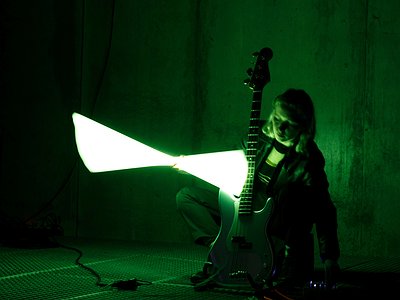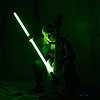Name: Ulla Suspekt
Nationality: German
Occupation: Bassist, producer, sound artist, songwriter
Current release: Ulla Suspekt's U is out via Verydeeprecords. Stream here, and buy a physical copy on bandcamp.
Recommendations: I love the performances of Laurie Anderson. She is such a great artist. Love the idea of being a pop artist and combining performances and pop music on shows.
Mick Karn - "Delis Car" is my favorite bassline. I love the sound of the fretless bass and the rhythmic figures he is creating in that track with the bass.
Lord Tusk
If you enjoyed this Ulla Suspekt interview and would like to keep up to date with her music, visit her on Instagram.
When I listen to music, I see shapes, objects and colours. What happens in your body when you're listening? Do you listen with your eyes open or closed?
It doesn't matter whether my eyes are open or closed because the experience is the same. It's like kissing someone. Some find it strange to keep their eyes open; I can't understand that.
I see images, but most importantly, I see a mini movie. Each song, to me, has a short film. And every time I hear the track, I see the film, whether my eyes are open or closed.
What were your very first steps in music like and how would you rate the gains made through experience - can one train/learn being an artist?
Weird question because I am an Art and Music student so I am doing kind of a training right now. Yes I think you can train beeing a “better artist“ by learning techniques wich help you to work more freely.
I had lessons in playing violin and piano. I hated it because the teachers and my family where very strictly about the lessons. So I quit playing already after three years.
Four years ago, I started making music again. I taught myself new instruments and producing. I believe I progressed quickly because I had received lessons as a child.
According to scientific studies, we make our deepest and most incisive musical experiences between the ages of 13-16. What did music mean to you at that age and what’s changed since then?
At this age I did not make any music. But I identified so much with particular music artists. Artists were my whole lifestyle: the way I talked, clothed myself and so on . My identity was completely dedicated to my music taste.
I was a looser and an outsider. Nobody was listening to this music back at that highschool, and nobody could relate to this music or lifestyle. I knew there was a scene where people were like me. At least, that feeling was given to me by the music.
Where does the impulse to create something come from for you? What role do often-quoted sources of inspiration like dreams, other forms of art, personal relationships, politics etc play?
Everything I would say.
Right now I am doing some kind of patchwork songs I would say. I take like 3, ore 4 favorite songs and I try to press them into 1 song with different parts into one pitch.
There are times where I have deep feelings about politics or social issues I want to do songs about. But most of the time I am also just fucked up about something and have to bring it down somehow
Paul Simon said “the way that I listen to my own records is not for the chords or the lyrics - my first impression is of the overall sound.” What's your own take on that and how would you describe the sound you're looking for?
Cool and warm simultaneously, both analog and digital, definitive, highly vivid, and metaphorical.
Also, it should be the perfect blend of all my favorite artists
Ulla Suspekt Interview Image by Lukas Pürmayr
Are you acting out certain roles or parts of your personality in your music which you couldn't or wouldn't in your daily life? If so, which are these? If not, what, would you say, are the key ideas behind your approach to music?
No I am not acting at all actually. All the songs from the first EP U are from real stories.
Sometimes I feel annoyed because I am not angry anymore about that topic but I still have to perform that song on stage.
Music is a language, but like any language, it can lead to misunderstandings. In which way has your own work – or perhaps the work of artists you like or admire - been misunderstood? How do you deal with this?
I'll pass on the question: I recently listened to an interview with an artist who was asked if it bothered him that a track suddenly started being listened to by a really odd audience, and if it bothered him because he couldn't relate to those people at all.
He mentioned afterward: 'Nothing can drag my song through the mud. The song remains what it is and cannot be altered just because certain people listen to it.' I think that's a very reasonable attitude
Making music, in the beginning, is often playful and about discovery. How do you retain a sense of playfulness as things become more professionalised and how do you still draw surprises from equipment, instruments, approaches and formats you may be very familiar with?
Openness. The biggest problem with many musicians is that as soon as they become nerds, they close themselves off because they think they know everything better.
The most important thing when listening to music or making music is to remain open. Besides, the most exciting things happen from mistakes. (These are some wise words that someone once told me, by the way ...)
Sound, song, and rhythm are all around us, from animal noises to the waves of the ocean. What, if any, are some of the most moving experiences you've had with these non-human-made sounds? In how far would you describe them as “musical”?
Sound performances have often left me astounded.
I don't think it has much to do with music. It's more of a partially physical experience.
Ulla Suspekt Interview Image (c) the artist
There seems to be an increasing trend to capture music in numbers, from waveforms via recommendation algorithms up to deciphering the code of hit songs. What aspects of music do you feel can be captured through numbers, and which can not?
Numbers are important for rhythm. Also numbers work well as “codes.” And codes make for better communication between musicians. There are descriptions wich try to describe a specific condition in music with the help of numbers.
I think sound design cannot be captured. Also, language - slang or codes spoken in certain circles and integrated into music (especially in rap).
How does the way you make music reflect the way you live your life? Can we learn lessons about life by understanding music on a deeper level?
Making music forces me to summarize my feelings and thoughts into a piece of music.
It's hard for me to focus on one thing. I usually have way too many pieces going on simultaneously, each being worked on at different speeds. It's the same in my life: I'm studying fine arts at university and simultaneously studying music, specifically electric bass. Somehow, though, everything manages to fall into place, including with my music.
I don't particularly like the term 'deeper understanding.' What does that mean? Can a child not learn life lessons through music because they don't understand the deeper meaning of music? I believe understanding the structures and intentions of an artist can be enhanced with a deeper understanding of music. But for me, that doesn't necessarily apply to life lessons.
We can surround us with sound every second of the day. The great pianist Glenn Gould even considered this the ultimate delight. How do you see that yourself and what importance does silence hold from your point of view? What role do headphones play for you in this regard?
A big deal! I can't leave the house without my noise-canceling headphones. I refuse to hear sounds I haven't chosen to expose myself to
Do you feel as though writing or performing a piece of music is inherently different from something like making a great cup of coffee? What do you express through music that you couldn't or wouldn't in more 'mundane' tasks?
A great cup of coffee will and can be finished at some point. Producing a peace a music is a never ending thing.
For example I can put things into the lyrics wich I would never say to specific people because I would be too proud to speak out.
Every time I listen to "Albedo 0.39" by Vangelis, I choke up. But the lyrics are made up of nothing but numbers and values which don't appear to have any emotional connotation. Do you, too, have a song or piece of music that affects you in a seemingly counterintuitive way – and what, do you think, is happening here?
I can’t say that about specific tracks. It's more that I don’t like certain sounds … I don’t know why , but I don’t like autotune or high pitched voices
If you could make a wish for the future – what are developments in music you would like to see and hear?
I hope that music can be composed and produced with a certain degree of freedom in the future. This, of course, can only happen if artists are treated fairly. I wish for a change in the music industry, and this might only be possible if capitalism is abolished, probably.
I wish I could hear a piece one day that's free from cadences, music theory, streaming numbers, or any other background influences. But I believe that's impossible.






